English Edition

- By CNI
- Category: English Section
- Hits: 693
CNI News
28 August 2023
The State Administration Council (SAC) has reported that it didn't inspect the Unite Amara Bank (UAB) although reports that the UAB was being inspected came out.
According to some news agencies and social media, security forces were inspecting the UAB. Some news agencies and social media were reporting that the UAB was being inspected, which were fake news only, said the SAC to news media.
When the banks were mainly attacked to cause the country's economy to collapse, although the Central Bank provided support to the banks, some banks were not faithful, said Maj-Gen Zaw Min Tun at the 22nd news conference of the SAC held on 22nd August, 2023.
Some banks were not honestly performing and they must be systematically watched, said Sr-Gen Min Aung Hlaing, chairman of the SAC at the meeting of the Economic Committee held on 25th August. Soon after that, reports that the UAB was being inspected by the SAC came out.

- By CNI
- Category: English Section
- Hits: 539
CNI News
28 August 2023
Kyauk Phyu, Dawei, and Thilawa special economic zones need to be implemented as soon as possible because they could support the development of the country, said Sr-Gen Min Aung Hlaing, chairman of the State Administration Council.
He said that above at the meeting of the Economic Committee held on 25th August, 2023.
Myanmar has already had special economic zones and industrial zones and there were less development because there were no effective actions to improve, said chairman of the SAC.
" Kyauk Phyu Special Economic Zones, Dawei Special Economic Zone and Thilawa Special Economic Zone can help not only for the economy and development of Myanmar but also for those of regional countries, so officials need to carry out to get the fast progress”said Sr-Gen Min Aung Hlaing.
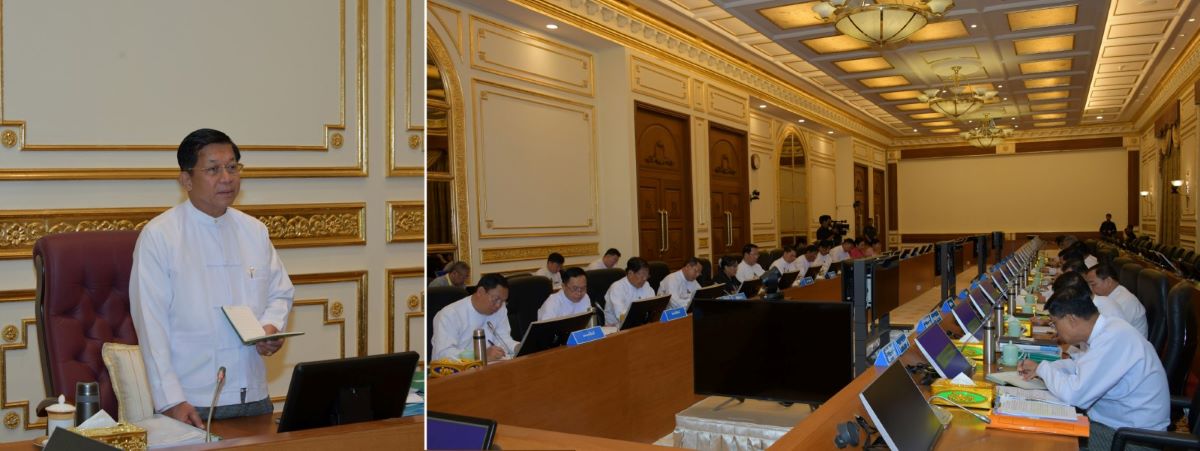
Sr-Gen Min Aung Hlaing at the meeting of the Economic Committee on 25th August 2023
There are greedy business people who prioritize their own interest. On the other hand, there are also business people who are supporting the country's economic development and they must be encouraged by the State, he said.
In the Market-oriented economic system, the government's interfere must be reduced as much as possible. But the government is unavoidably controlling and adjusting because of the current economic sanctions and attacks, said chairman of the SAC.
Currently, Kyauk Phyu, Dawei and Thilawa special economic zones cannot be implemented because Myanmar political landscape has changed into armed conflicts after 1st February 2021.
Because of being unable to implement the special economic zones, an inflow of foreign money has decreased and economic recovery is weak.

- By CNI
- Category: English Section
- Hits: 588
CNI News
28 August 2023
Reviews and discussions are under way among Myanmar politicians why Myanmar can't take the ASEAN chairmanship after the news that Myanmar has abandoned its rotating chairmanship came out According to PBS, a Thai News Agency, Myanmar said.
that it would take the ASEAN chairmanship only in 2027 as it wouldn't be ready to take the chairmanship in 2026 because of its domestic issues.
SAC and ASEAN need to approve that Myanmar has abandoned its rotating chairmanship, and there is a question whether an elected government can't arise until 2026, or not, said Dr.Aye Maung, chairman of the Arakan Front Party (AFP), to CNI News.
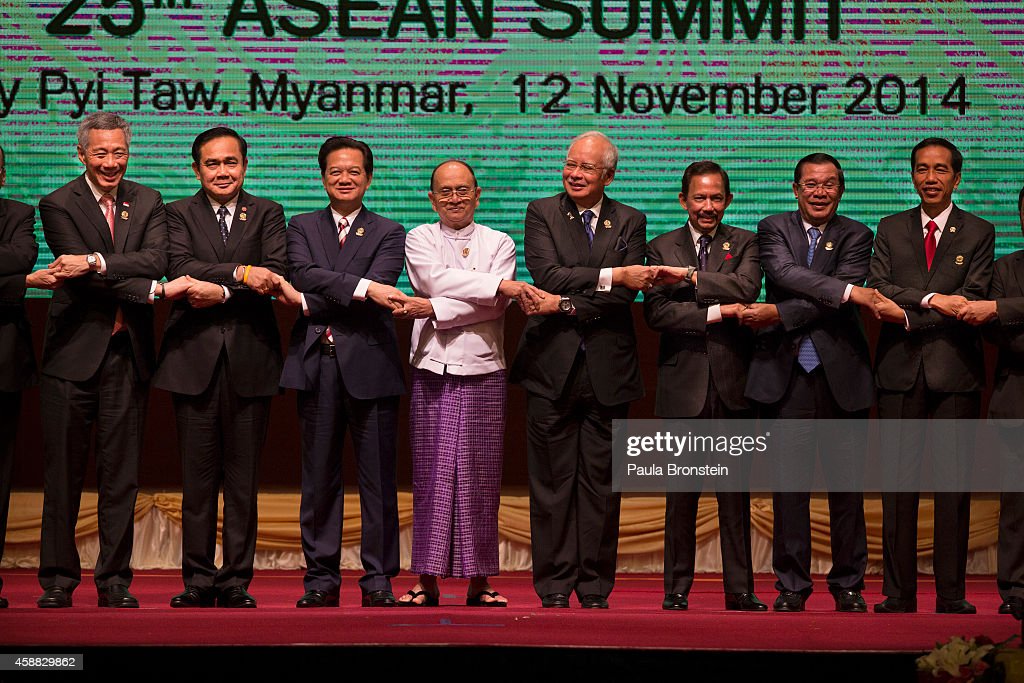
An ASEAN meeting hosted by Myanmar was being held in 2014 under the government led by U Thein Sein
" It is important whether the news is true or not. News makers will write why. Because of Mahathir, Myanmar joined the ASEAN under U Than Shwe. But U Than Shwe didn't take the chairmanship. In 2014 when an elected government had arisen, Myanmar took the chairmanship under U Thein Sein. Those who want to analyze the situation of Myanmar ask what will happen in 2026. The answer from the SAC is needed. The SAC have to answer whether its period will be until 2026 or not and whether an elected government will arise or not until that year. Those who want to ask such questions probably released the news." he said.
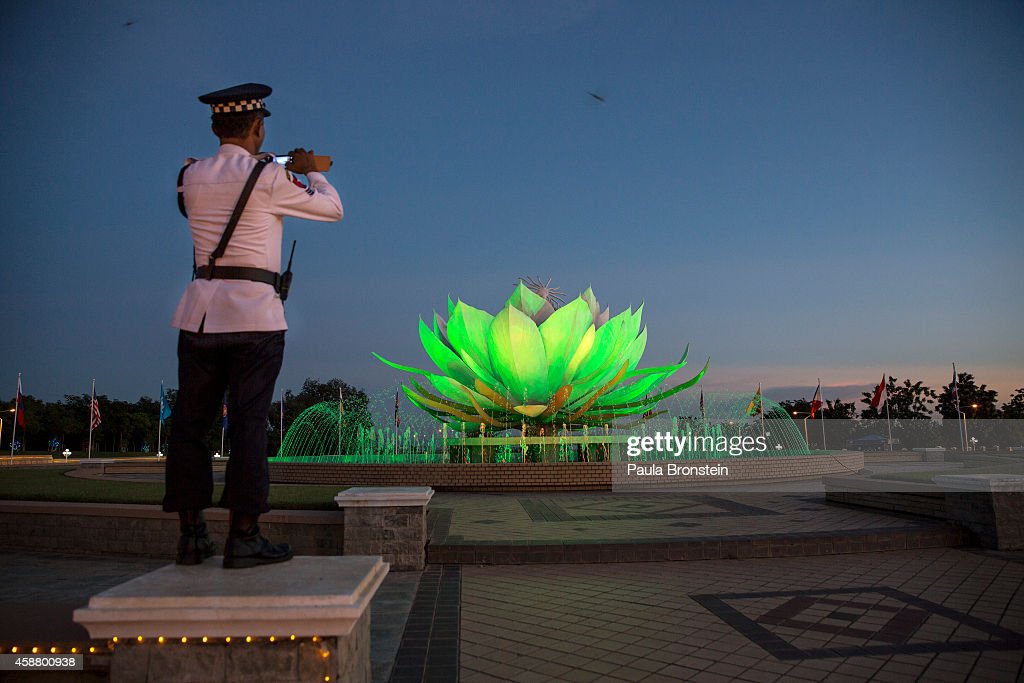
A traffic circle in Naypyidaw
Although Myanmar got a chance for the ASEAN rotating chairmanship according to the English alphabet in 2006 after it became a member of ASEAN in 1997, it was not able to take the chairmanship because of its domestic problems.
Myanmar was able to take the chairmanship under the President U Thein Sein in 2014.
It would depend on whether an elected government would arise in 2026 or not, said Col.Saw Kyaw Nyunt, spokesperson of the Peace Process Steering Team (PPST) to CNI News.
"The political situation in our country is not normal. Whether Myanmar is ready to take the ASEAN chairmanship in 2026 or not depends on whether an elceted government will arise in 2026 or not." he said.
Due to the political landscapes that changed after 1st February, 2021, armed conflicts have been breaking out widely in the country which is facing with crises.
ASEAN would not easily give the chairmanship to the SAC, said Ko Banyar, director of the Karenni Human Rights Organization, to CNI News.
"If the ASEAN give the chairmanship to the military council that is cruel and violates the human rights, it will be the ASEAN's history. If it gives the chairmanship to the SAC, it violates its charter that will build democracy, peace and harmony. Because it is related to the dignity of ASEAN, ASEAN will not easily give the chairmanship to the military council." he said.
The State Administration council that has taken power has said that it will hand over the winning political party after a general election is held.

- By CNI
- Category: English Section
- Hits: 619
CNI News
26 August 2023
As those who have held Myanmar kyats are performing to make the prices of cars and gold higher, it must be dealt with to stabilize the prices, said Sr-Gen Min Aung Hlaing, chairman of the State Administration Council.
He said that above at the meeting of the Economic Committee held on 25th August, 2023.
The committee must carry out mandatorily to promote the national economy and what should be performed is needed to perform as soon as possible.
And it is necessary to give priority to businesses that are quickly achievable. Moreover, some very greedy business people are making speculations to make the commodity prices higher and so officials need to emphatically supervise to make them perform in accordance with the procedures, he said.
"Those who are mainly making speculations on the financial market are Myanmar kyat holders, foreign currency holders and gold holders.
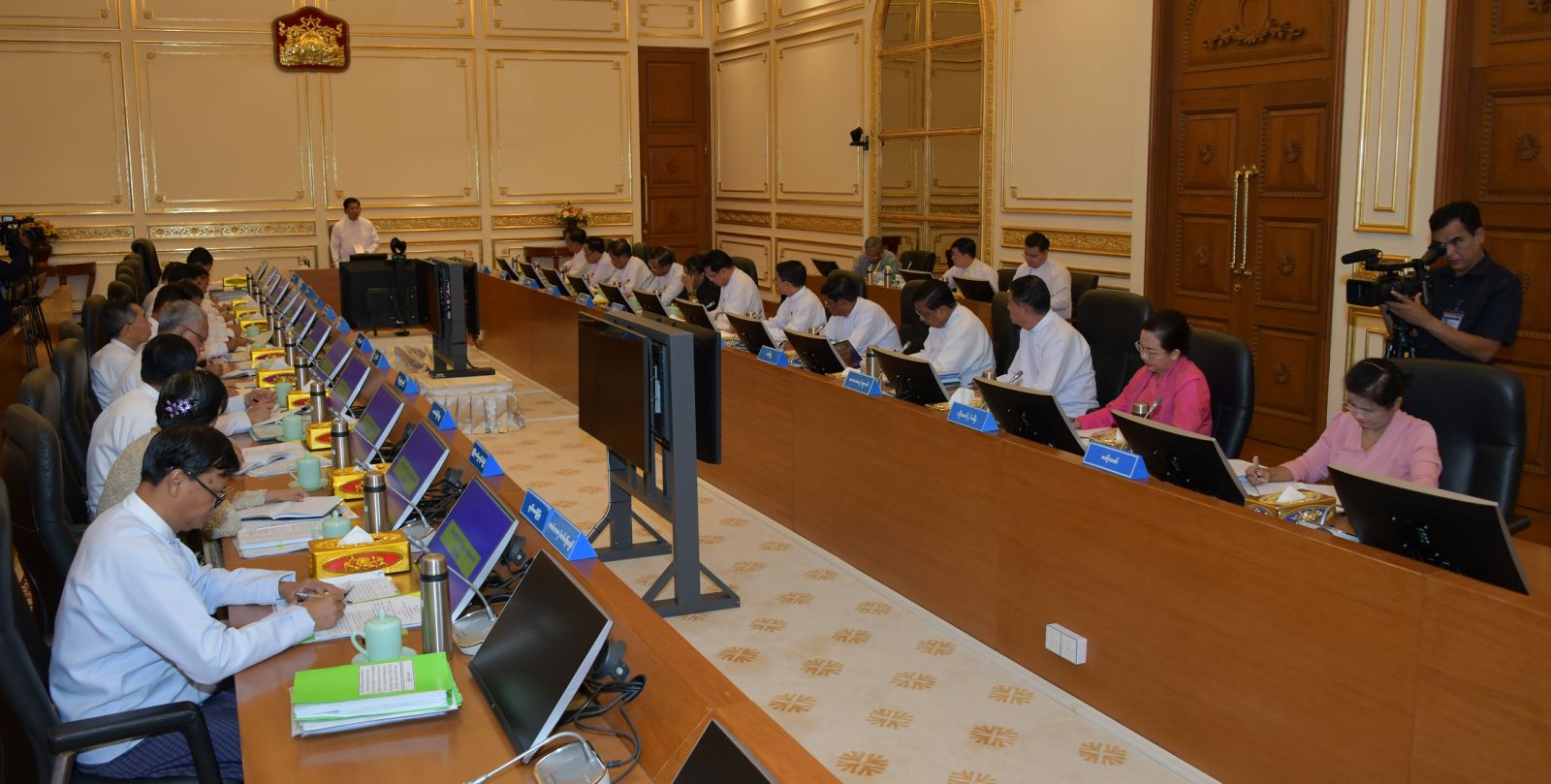
The meeting of the Economic Committee was being held on 25th August, 2023
Myanmar kyat holders are performing to make the gold price higher, buying gold. Foreign currencies holders are performing to make the prices of foreign currencies higher. In the same way, the prices of cars are rising than what they should be. So, the committee needs to handle it systematically." he said.
The current dollar price is 3,700 kyats per dollar and the gold price also is over 3,000,000 kyats per tical. In the same way, a car that was paid over 3,000,000 kyats in April, 2021 is now paid over 100,000,000 kyats.
Relatives of the officials and those who are close to the officials are among the people who are making speculations to make the prices of gold, dollar and car higher and those who commit money laundry are also included according to the markets of gold, dollar and cars.

- By cni
- Category: English Section
- Hits: 3427
CNI News
26 August 2023
As a result of cooperation between Thailand's Kbank and Myanmar's Kanbawza Bank (KBZ), a digital money transfer service has started so that Myanmar people in Thailand can officially transfer money to Myanmar through mobile phone without having to go to a bank, which was announced on 23rd August, 2023.
If a Myanmar national in Thailand has KBank's K Plus Mobile Banking application on his mobile phone, he will be able to transfer Myanmar kyat to KBZPay.
He can transfer 100,000 to 5,000,000 kyats at a time.
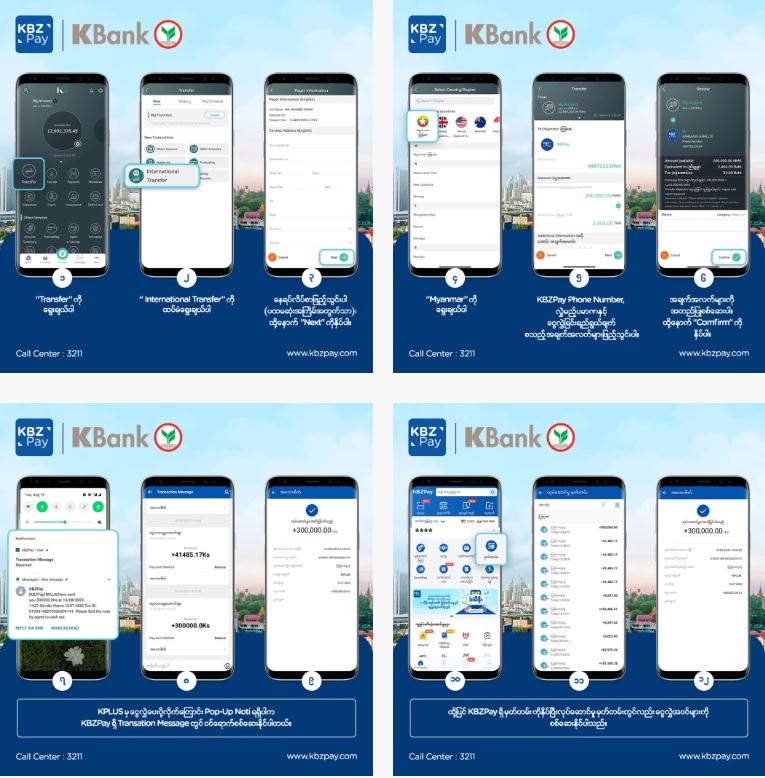
Showing functions of KBZPay-K Plus step by step
The service fee ranges from 50 to 250 baht depending on the amount of money to be transfered. Myanmar people in Thailand can officially transfer money to Myanmar without having to go to a bank and as a person who uses the hundi system to transfer money is worried to be cheated, transferring money on his phone is more safe and sound, said Ko Moe Lay who is working in Thailand, to CNI News.
" The monthly income of an ordinary worker like me is 1,500,000 kyats at most. So, this digital system is convenient for us and it's more safe and sound. Those who transferred money through brokers were cheated and lost a lot of money.There are also many liars. If you get scammed, it's not easy to get your money back. Because of the bank-to-bank connection, the error will be less. Lies will be less. It's more secure." he said.
If a Myanmar national in Thailand opens an account book in KBank, his passport and a letter of recommendation from the place where he lives are needed. If he is a student, he needs a student card and if he is a worker, a labor card is required.
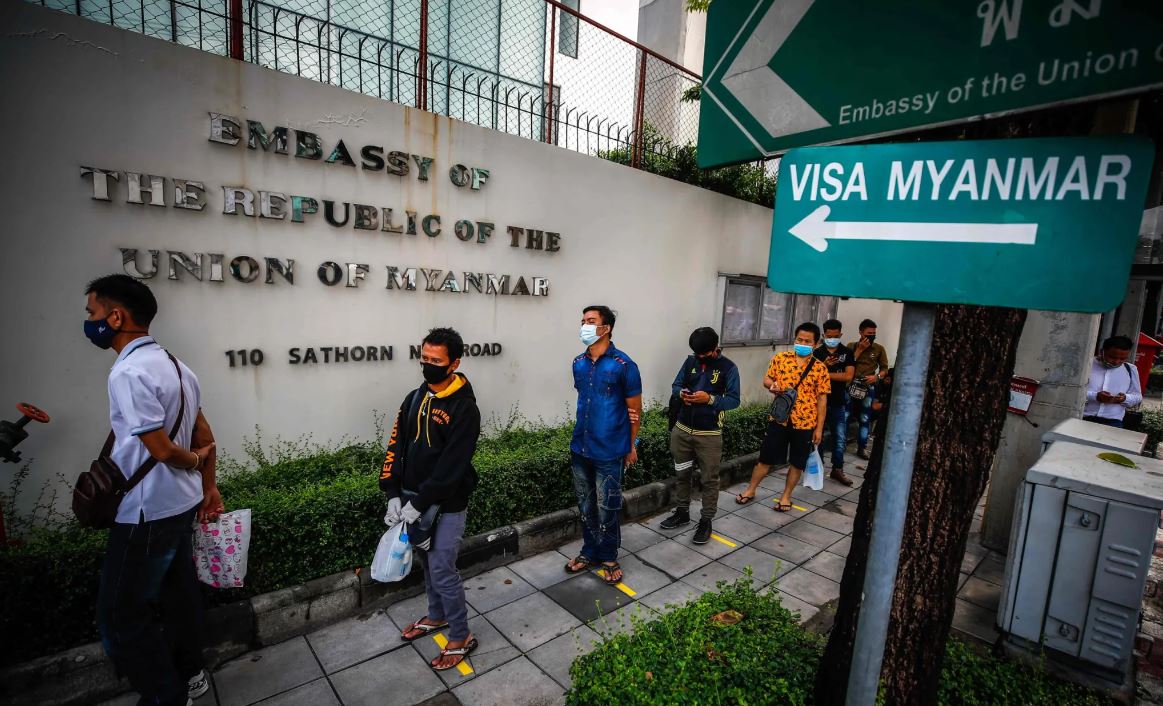
Myanmar citizens in front of Myanmar Embassy in Thailand
In the past, when making official money transfers to Myanmar, you needed to go to a bank in person. in the Hundi system, service charges range from 20 to 80 bahts reportedly.
Because the service fee is not so much when making money transfers from K PLUS to KBZPay, it is reportedly convenient for Myanmar people in Thailand.
However, KBZPay has not been widely used in the rural areas and small towns and in addition, because people there are weak in technological knowledge, lots of liars might arise, said Ko Thar Gyi, one of the people helping migrant workers, to CNI News.
"There are so many liars these days. Some people might advertise online with the photos of banknotes that money transfer can be performed through their Kpay account.
People in rural areas have no KPay accounts. So, people are likely to be cheated. There are many liars based on KPay in Myanmar. Secondly, we can say that this system is a policy of the government. When Myanmar migrant workers transfer money to Myanmar, who transfers what amount of money can be easily known." he said.
When making money transfers from K Plus to KBZPay, as 1,216 bahts is designated for 100,000 kyats,it is much more than the external exchange rate, which people review.
So, people will not use this system soon. So, if a reasonable price was designated, it would be better, said people.

- By cni
- Category: English Section
- Hits: 726
CNI News
26 August 2023
There are reviews and discussions among the politicians and businessmen relating to what will be affected by the prohibition order of the National Unity Government not to use 20,000 kyat banknotes in the private banks and in the financial service.
Due to the statement, the people may find it difficult and there is a situation in which the banks must use the 20,000 kyat banknotes, said a politician.
Although the NUG has stated not to use 20,000 kyat notes, according to the bank circulation, they must be used, said U Thet Zaw, an economic analyst to CNI News.
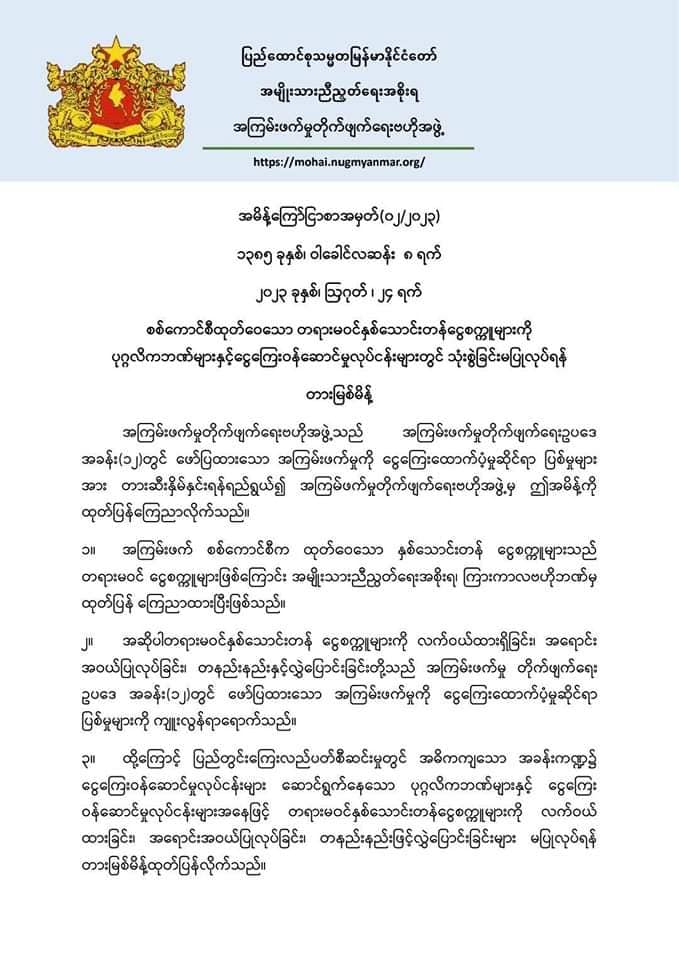
The NUG's statement
" To tell you frankly, let me ask you. The words of those who have power and the words of those who don't have power - which ones do you believe. Those who don't have power are saying not use it. It doesn't make sense, I think. An existing government that has power has issued it. Those who want to use it will use although they are told not to use it. Those who believe in the words of the NUG might not use it." he said.
Keeping 20,000 kyat notes in hand, trading the notes and transferring the notes in some way are equal to committing the crimes relating to financial supporting to terrorism which is mentioned in chapter 12 of the anti-terrorism law, stated the NUG.
If anyone fails to comply with the prohibition order, they will be taken action against in accordance with the anti-terrorism act, said the NUG.
That the prohibition order can be implemented is the answer to the problem, said Dr.Aye Maung, chairman of the Arakan Front Party (AFP) to CNI News.
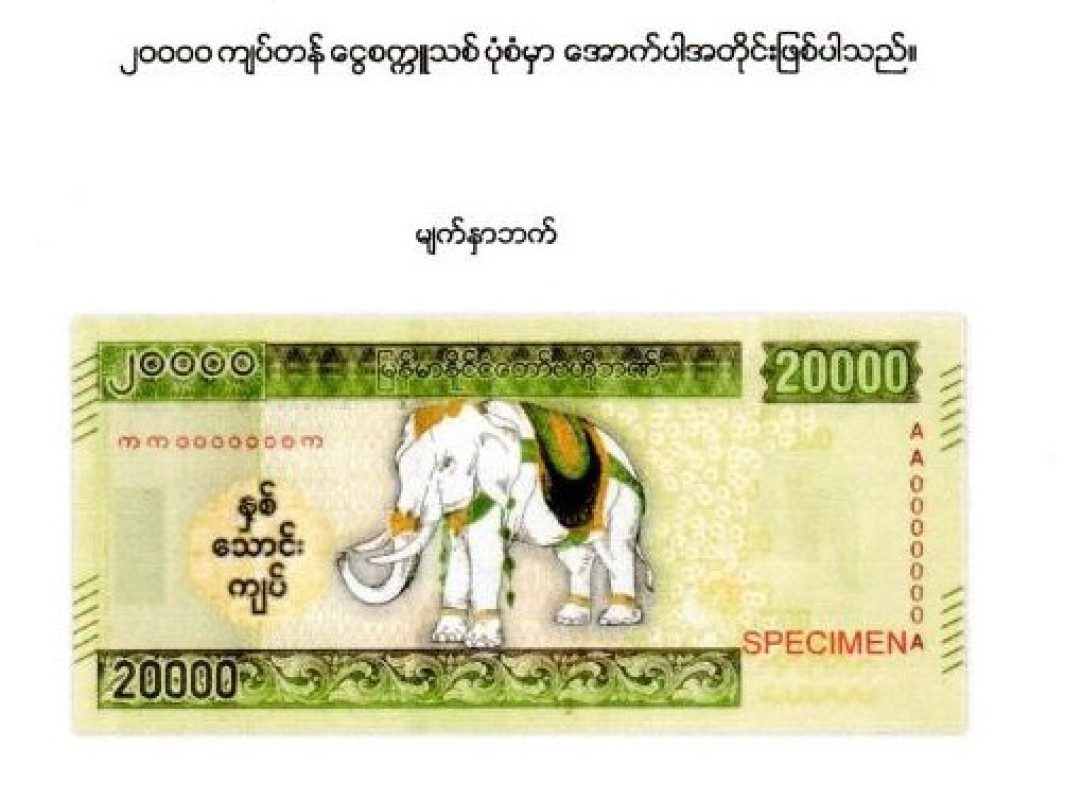
Design of 20,000 kyat banknote that will issued by the Central Bank
" I can't say what they (NUG) are doing. They have said they will oust the Tatmadaw in 2023. But there is a very wide gap between theory and reality. Goal is like a theory. Only if you can implement, you can get the answer. I think their statement is just fiction." he said.
In commemoration of the completion of the Mara Vijaya Buddhist Image and to mark the white elephant's first year birthday, new 20,000 kyat notes will be issued in a limited number on 31st July, 2023, the Central Bank announced on 23rd July, 2023.
20,000 kyat notes to be issued on 31st July, 2023 by the Central Bank are designated as illegal banknotes, the NUG stated on 27th July.

- By cni
- Category: English Section
- Hits: 641
CNI News
26 August 2023
The increase in the prices of rice in the country was not unrelated to the actions of the State Administration Council (SAC), said U Thet Zaw, an economic analyst to CNI News.
Because the prices of rice have risen in the world at present, the price of Myanmar rice that is being exported will rise which traders are expecting.
But the SAC would review the policies relating to exports, said Maj-Gen Zaw Min Tun, Chief of the Tatmadaw True News Information Team at the SAC's news conference held in Naypyidaw on 22nd August, 2023.
The SAC has not taken action effectively to make the domestic rice prices decline, said U Thet Zaw.
" SAC' actions are involved in making the rice prices go up. They said they would review the policies. When they want to get export earning so much, they are making to raise the rice prices, expecting the rice price are to go up in the world market. And they said they would encourage exporters. While the rice prices are going up, they don't take action." he said.
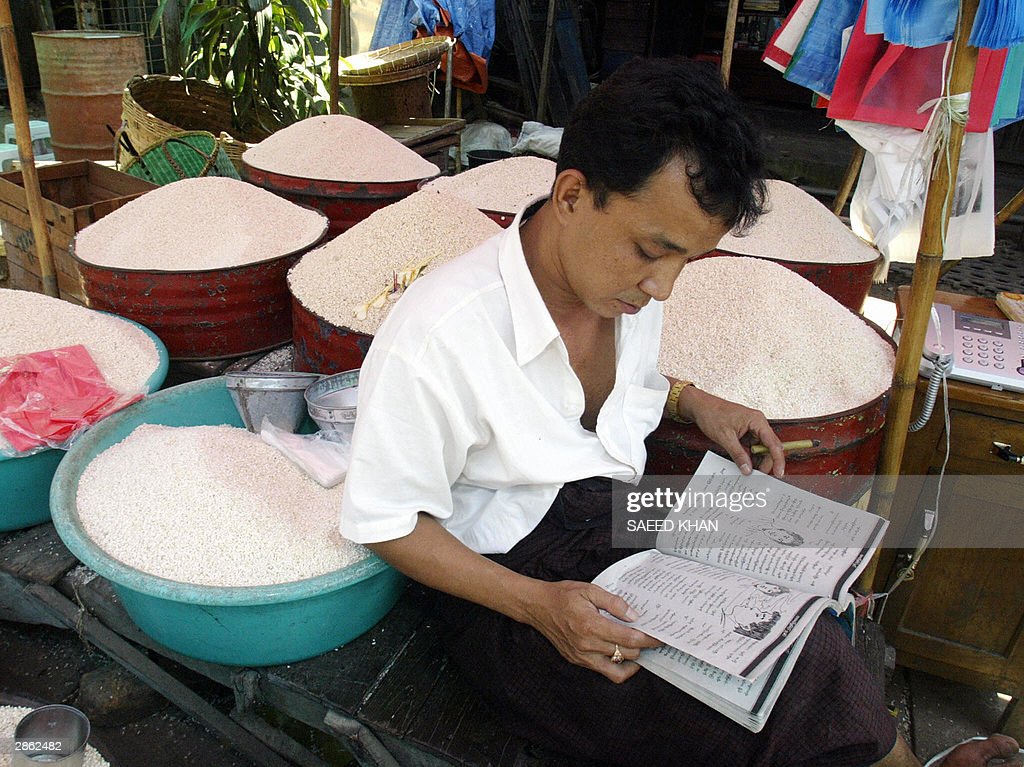
A rice shop
The current domestic rice prices are at a record high, and the price of Shwe Bo Porsan is 148,000 kyats per bag (105 lb) and Ayeyarwady Porsan, 125,500 kyats and Sin Thukha, 95,000 kyats and Aemahta 25 marks (coarse rice), 70,000 kyats.
Because international rice prices are going up, the price of the rice that is being exported also is going up. So, the people have to be buying rice at higher prices, said U Thet Zaw.
" Although the government is promoting rice export, exports should be encouraged only when there is domestic self-sufficiency. Rice Chamber of Commerce buy the rice as much as they can get at a higher price without caring about domestic affairs. And then rice prices are getting more higher. The people get into trouble." he said.
At present, rice prices are skyrocketing and in relation to that, the government would perform policy adjustments, said Maj-Gen Zaw Min Tun.
As the rainfed rice will appear in abundance in the next 2 months if the government sold reserve rice at a lower price, it would reduce the people's anxiety, said U Thein Aung, chairman of the Farmers Development Association to CNI News.
" The government can sell reserve rice for basic staffs and basic class a bag of rice to a household a month at a reasonable price. And the government should go to slums by car and sell rice at 60,000 kyats a bag. If doing so, it will reduce the public anxiety. News rice will appear in two months." he said.
Although the selling price of 100 baskets of rainfed paddy rice was 9 to 10 lakh kyats in 2022, the selling price in 2023 is 17 to 18 lakh kyats.
The selling price of 100 baskets of Aemahta paddy rice was 530,000 in the past and now is around 18 lakh kyats.
Although the prices of paddy rice and rice are high, inputs such as pesticide, herbicide, fertilizer and fuel also are expensive. So, most farmers can enjoy a little benefit reportedly.
The government should sell its reserve rice at present and if it sells when the paddy rice appear in abundance, farmers will face with loss because the price of paddy rice could fall down, review farmers.

- By cni
- Category: English Section
- Hits: 1100
CNI News
25 August 2023
Politicians and EAO leaders are reviewing discussing differences between Thailand and Myanmar in dealing with peace, stability and economy when the military leaders take political power.
Whenever the military takes power in Thailand, the country's economy, education, health, tourism sectors do not tend to be adversely affected. However, whenever the military takes power in Myanmar, the country's political, economy, education, health sectors tend to deteriorate.
Whenever the military takes power in Thailand, the US does not impose any sanctions and the public and army do not tend to commit violence, said Col. Khun Okka, an EAO leader to CNI News.
" When the military takes power, the US doesn't impose sanctions. But soon after the military took power, the US tend to suspend its aids to Thailand for a short time. When the military seizes power in Thailand, the public doesn't protest in a big way. The public also is not affected. Thai king also is the main pillar. If he didn't object the coup, demonstrations wouldn't take too long. When Thai king didn't agree to the coup, it was not successful. When General Suchinda couped, he suppressed brutally the protesters. But when Thai king admonished him, brutal suppression stopped." said Col.Khun Okka.
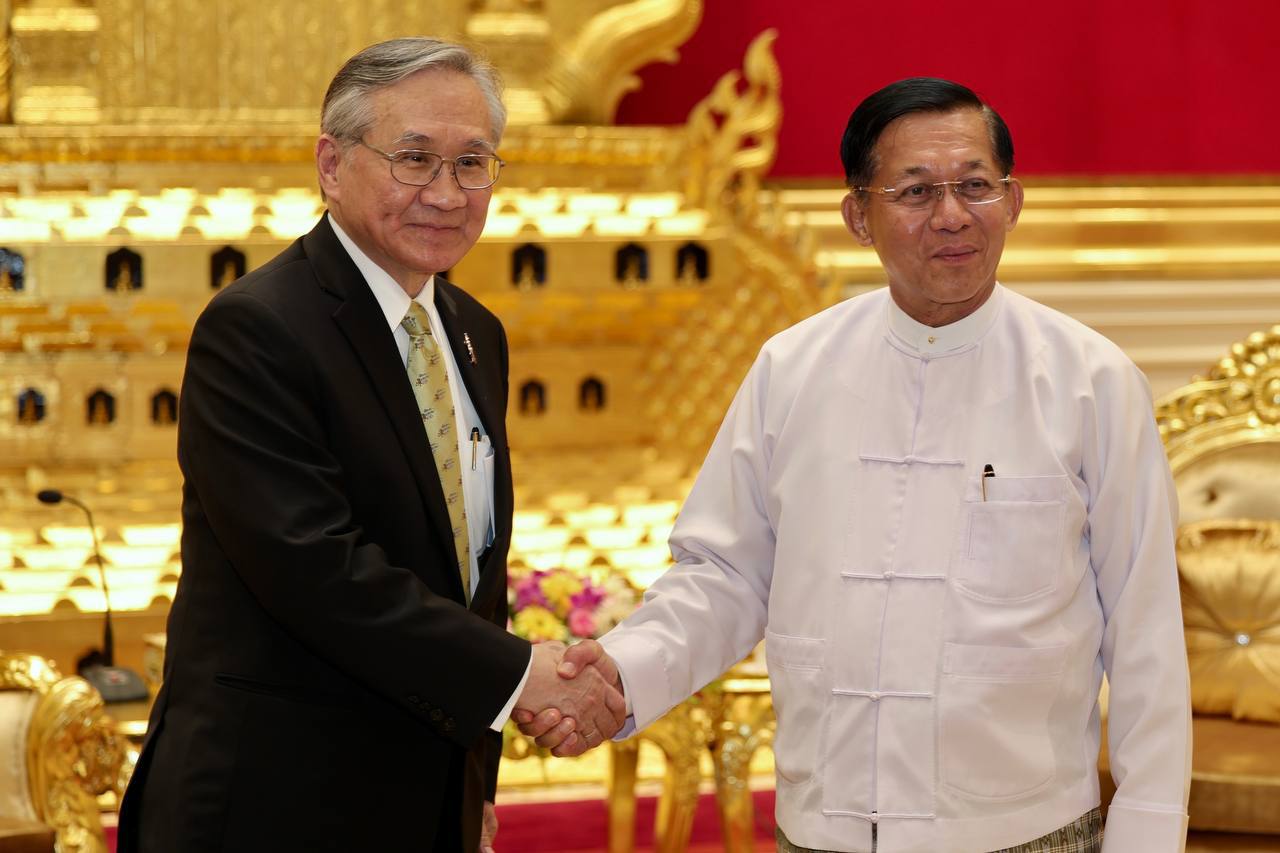
Don Pramudwinai, Deputy Prime Minister of Thai Caretaker Government and Sr-Gen Min Aung Hlaing
Because there are no individuals and institutions that can intervene and maintain, terrorist attacks cannot be stopped, he added. There are no pillars that can intervene in our country.
“That's why, we are finding it difficult. I had told ethnic leaders if we would intervene soon after the coup took place. But They didn't dare to do so. Now that there aren't any intervention, terrorist attacks are endless." he said.
There are 19 coup d'états in Thailand between 1932 and 2014. Although the number of coup d'état is less than in Thailand, a coup d'état tends to take several decades.
Due to the military coup, Thai economy also tend to decline. But Thai management is better than Myanmar, said Yebaw Aye Lwin, spokesperson of the All Burma Students Democratic Front (ABSDF) to CNI News.
"The participation of the institutions and experts in Thailand are much better than in Myanmar. As soon as the military coups in Myanmar, due to poor management, economic decline and a lot of setbacks arise." he said.
If the foundations of the country - freedom, justice and equality are dysfunctional, armed conflicts will be occurring, said U Ko Ko Gyi, chairman of the People's Party (PP) to CNI News.
" To tell you frankly, a government - any kind of government is most responsible for all the problems of the country. If you put blame on the opposition and underground activists that instabilities arise because of them, it's not enough. Why do these problems arise? The foundations of our country - freedom, justice and equality in the Independence Declaration which are carved in the Independence Monument in the center of Yangon, if these basics are broken, political conflicts and armed conflicts will take long" he said.
Due to the current armed conflicts, the country's politics, economy, education and health are deteriorating and the public is facing with crises as well.

- By cni
- Category: English Section
- Hits: 731
CNI News
25 August 2023
Tourists from China and India who will come to Myanmar will be given visas on arrival, U Aung Aye Han, deputy director general of the Ministry of Hotel and Tourism told CNA News.
Although it is not known exactly when visas on arrival will be issued to these tourists, it is likely to start in the next open season, he added.
" They are our neighboring countries and most of tourists who go abroad are from these countries. Moreover, most of tourists who come to our country are from these countries as well. So, we have planned to give the visas on arrival to the tourists from these countries. Other countries might be given visa on arrival, I think. After knowing early the news that will give visa on arrival, If the marketing is conducted in their countries, the number of tourists who will come to Myanmar can increase. We can't grant visa on arrival. It just belong to the foreign affairs and immigration departments." he said.
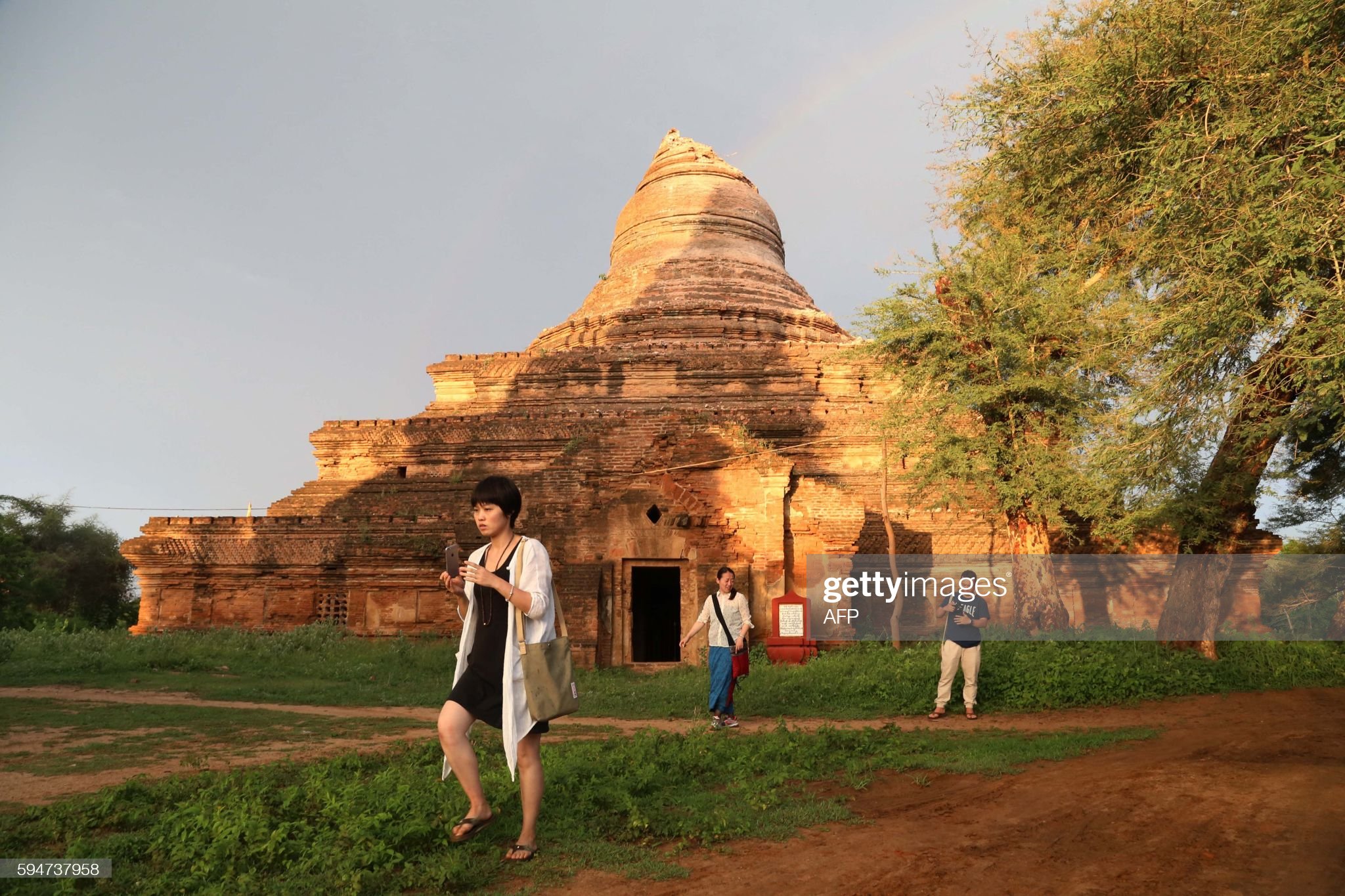
Chinese tourists in Bagan
In 2019, Myanmar granted visa on arrival to India and China, according to the statistics of the Ministry of Hotel and Tourism, over 13,000 Indian tourists entered Myanmar through the Yangon Airport during the first four months that year.
In the same way, 520,000 Chinese tourists entered Myanmar from January to September in 2019.
Whether visa on arrival is granted or not should depend on the number of tourists who came to the country, said U Zaw Weik, chairman of the Myanmar Hoteliers Association (Bagan Zone) to CNI News.
"When we are unable to get up on our own for the time being, we need help to get up again. According to the current situation, we are making plans to make visitors enter. After granting visas on arrival, we have to study whether it has produced positive impact or negative impact. Depending on the results, we might increase or reduce visa on arrival. The government should do so." he said.
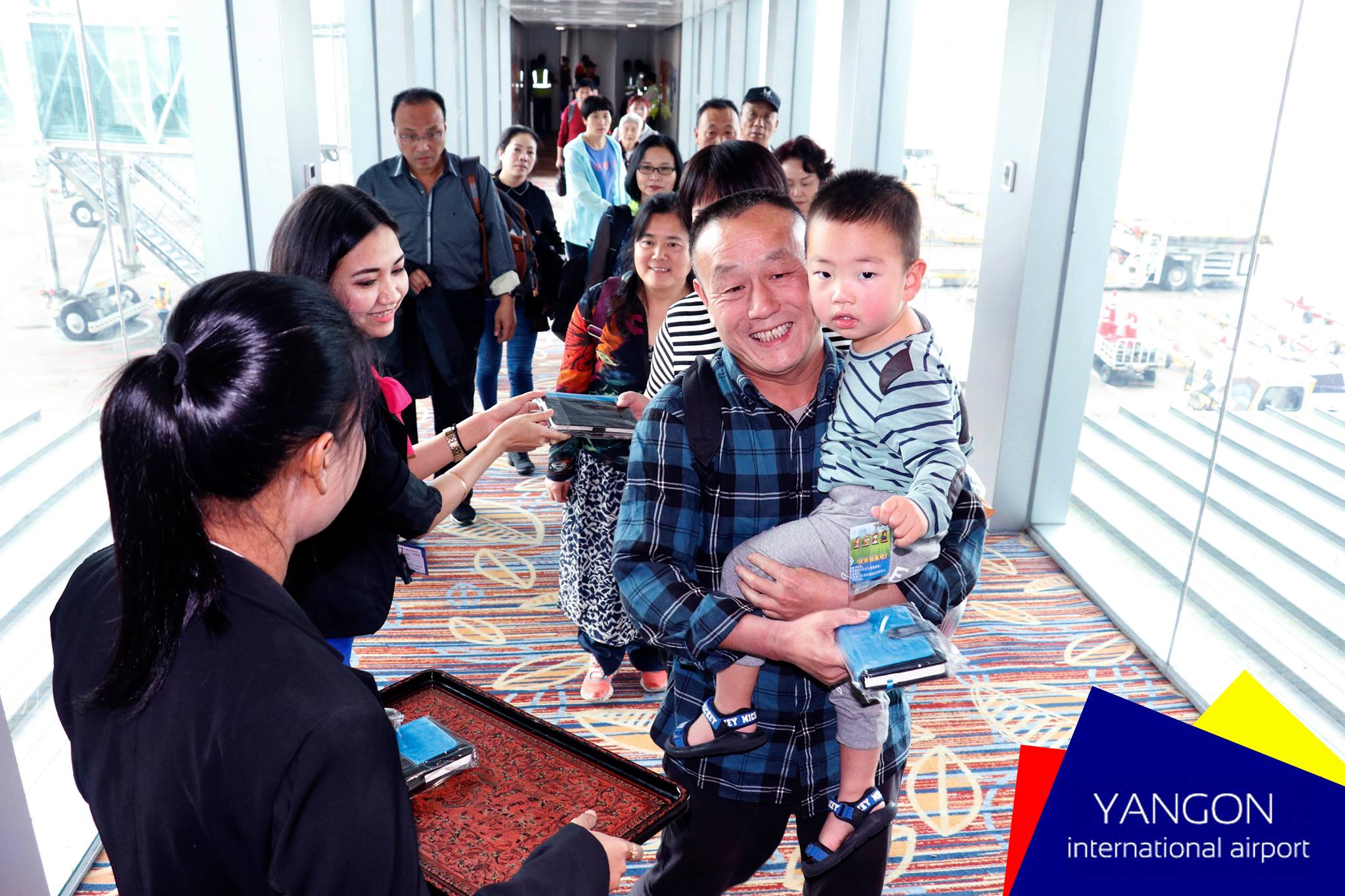
Foreign tourists at the airport
Not only India and China, South Korea, Japan and Russia would also be granted visa on arrival, according to businessmen.
If the visa on arrival was granted, because more foreign tourists might enter, the government should ease restrictions on foreign tourists who want to come to northern Shan State, said U Zaw Zaw, chairman of Northern Shan State Hotelier Association to CNI News.
" I don't think tourists are allowed to come to northern Shan State. There is not in a situation to be able to grant visa on arrival for northern Shan State, that they have reviewed, I think. Tourist should be allowed to come to Lashio, I think." he added.
The number of foreign tourists who entered Myanmar was about 3.55 million in 2018, over 4.5 million in 2019, over 800,000 in 2020, 120,000 in 2021, over 360,000 from April 2022 to March 2023, according to the statistics of the ministry of hotel and tourism.



